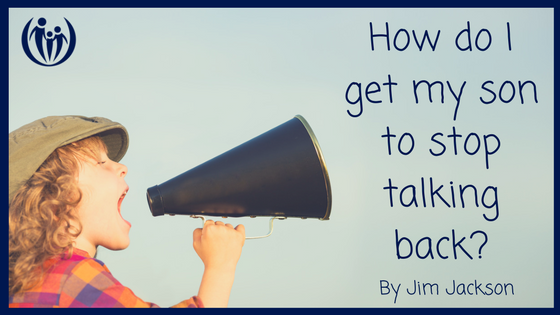
How do I get my son to stop talking back?

How do I get my 7-year-old son to stop talking back to everything we say? He is always right and we are always wrong! … We try discipline, taking away some of his toys, etc. but nothing seems to work. Any suggestions would be GREATLY appreciated!
Parents get justifiably exasperated with incessant backtalk, but the typical reflexive response — punishing backtalk — is like putting fertilizer on it.
Especially when the punishment is administered in frustration, it proves to the child that he has gotten control of the parent’s emotions and he’s really in charge, which is what he is looking for. Controlling behavior toward others is usually an indication of heightened internal anxiety in a child. Your son likely has a higher, valid need for “healthy power” to help him feel internally balanced and let go of the need to control your behavior.
There is no easy, pat answer for the balktalk challenge, because the habits and dynamics that fuel it are usually pretty entrenched. The following basic process however, has helped many parents and kids get through this challenge more effectively.
1) Focus on “whatever is good”.
If your focus is only on what you want to stop versus what you want to grow, it’s tough to make progress. It’s important to get a vision for how God might use the “gifts gone awry” behind his misbehavior — his intensity, quick mind, and strong will. (And probably others! He may have strong leadership potential if guided well.)
Spend some time going on a treasure hunt for good things he does or gifts he has, both when he’s not arguing and even in the midst of defiance! Check out this tip on affirmation if you need some help. Then, give some energy to affirming whatever is good as part of your strategy to address the trouble.
2) Give him opportunities for healthy control and power.
Once you identify some of the gifts and good things, you can set your child up to use those gifts in joyful ways. “Wow, you are sure determined and quick with your words. You can probably do some pretty cool things with those gifts when you set your mind to it!” Find examples of times he has used his gifts to help others, and encourage him to use his strong will constructively.
3) Empathize with how he feels.
Empathy can be a powerful tool. Expressing it often takes the wind out of a child’s sails of defiance. “Huh, I can see you really feel frustrated, and would like to stay up til 9:00. It’s fun to stay up late. I wish I could let you do that without it hurting your body. Our rule is still 8:00, but I can understand why you would really want to. I remember feeling that way.” (Here are some tips for expressing empathy.)
4) Don’t talk back to his backtalk.
Our lectures and firm responses to backtalk can actually set the example for more backtalk. Though your tone and logic may be “better” than your child’s, when he’s upset his brain is not receptive to anything but some sort of fight or flight response. So your words just cement his feelings of shame for talking back, and teach him that talking back is how to express himself. A vicious cycle.
5) Communicate love in the middle of misbehavior.
One mom reported that when her daughter sassed back to the request to do a chore, instead of the normal firm response mom just took a breath, smiled, and said, “I love you even when you sass back like that. Do you need a hug or do you want to take a break?” The daughter immediately settled and said, “Sorry mom. I’m just crabby.” They talked easily about the chores and made a plan. Mom was flabbergasted that it could really be so easy to deflate her daughter’s backtalk. Love truly does cover a multitude of sins.
6) If a consequence is still needed, administer it wisely and calmly.
“I can see this just isn’t a good time. Let’s both settle down and talk when we can be more respectful. If you decide to keep talking this way then you’ll lose your ride (or toy, or food, or whatever is related to the issue).” Calm. Minimal words. Only say more if you’re repeating or very simply building on what you’ve already said.
7) If you blow it (which we all do), set an example by apologizing.
We all blow it. When you do, you have a great opportunity to teach what to do when that happens. Say clearly what you did wrong. Say clearly what you wish you had done instead. Ask for forgiveness. This will both reinforce doing it better in the future and set a pattern for what to do when you (or your child) blow it.
Want to learn more about these concepts? Download our one hour recording of a Discipline That Connects workshop.

